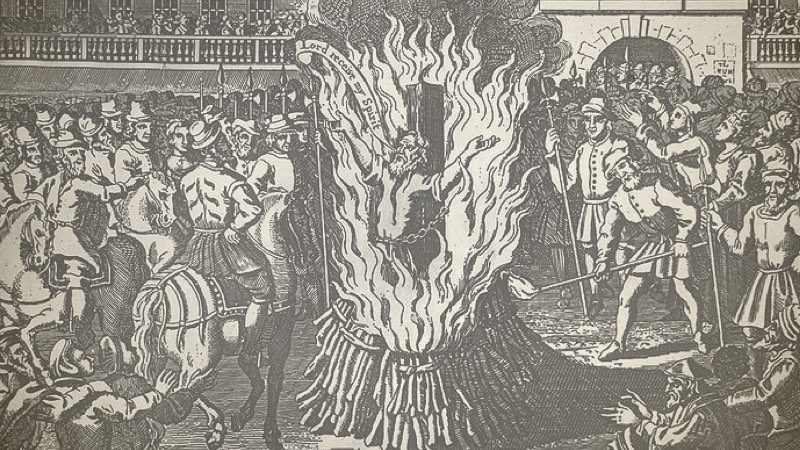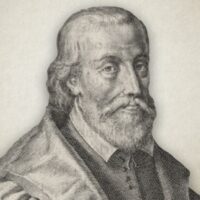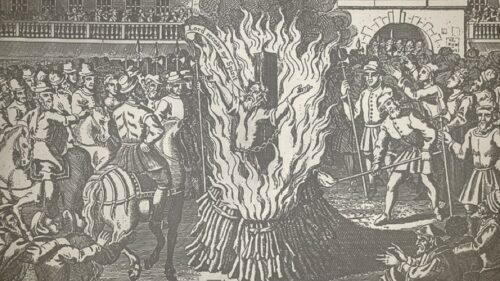
The Life And Ministry Of John Rogers
Foxe’s Book Of Martyers
John Rogers was educated at Cambridge, and was afterward many years chaplain to the merchant adventurers at Antwerp in Brabant. Here he met with the celebrated martyr William Tyndale, and Miles Coverdale, both voluntary exiles from their country for their aversion to popish superstition and idolatry. They were the instruments of his conversion; and he united with them in that translation of the Bible into English, entitled “The Translation of Thomas Matthew.” From the Scriptures he knew that unlawful vows may be lawfully broken; hence he married, and removed to Wittenberg in Saxony, for the improvement of learning; and he there learned the Dutch language, and received the charge of a congregation, which he faithfully executed for many years. On King Edward’s accession, he left Saxony to promote the work of reformation in England; and, after some time, Nicholas Ridley, then bishop of London, gave him a prebend in St. Paul’s Cathedral, and the dean and chapter appointed him reader of the divinity lesson there. Here he continued until Queen Mary’s succession to the throne, when the Gospel and true religion were banished, and the Antichrist of Rome, with his superstition and idolatry, introduced. The circumstance of Mr. Rogers having preached at Paul’s cross, after Queen Mary arrived at the Tower, has been already stated. He confirmed in his sermon the true doctrine taught in King Edward’s time, and exhorted the people to beware of the pestilence of popery, idolatry, and superstition. For this he was called to account, but so ably defended himself that, for that time, he was dismissed. The proclamation of the queen, however, to prohibit true preaching, gave his enemies a new handle against him. Hence he was again summoned before the council, and commanded to keep his house. He did so, though he might have escaped; and though he perceived the state of the true religion to be desperate. He knew he could not want a living in Germany; and he could not forget a wife and ten children, and to seek means to succor them. But all these things were insufficient to induce him to depart, and, when once called to answer in Christ’s cause, he stoutly defended it, and hazarded his life for that purpose. After long imprisonment in his own house, the restless Bonner, bishop of London, caused him to be committed to Newgate, there to be lodged among thieves and murderers. After Mr. Rogers had been long and straitly imprisoned, and lodged in Newgate among thieves, often examined, and very uncharitably entreated, and at length unjustly and most cruelly condemned by Stephen Gardiner, bishop of Winchester, the fourth day of February, in the year of our Lord 1555, being Monday in the morning, he was suddenly warned by the keeper of Newgate’s wife, to prepare himself for the fire; who, being then sound asleep, could scarce be awaked. At length being raised and awaked, and bid to make haste, then said he, “If it be so, I need not tie my points.” And so was had down, first to bishop Bonner to be degraded: which being done, he craved of Bonner but one petition; and Bonner asked what that should be. Mr. Rogers replied that he might speak a few words with his wife before his burning, but that could not be obtained of him. When the time came that he should be brought out of Newgate to Smithfield, the place of his execution, Mr. Woodroofe, one of the sheriffs, first came to Mr. Rogers, and asked him if he would revoke his abominable doctrine, and the evil opinion of the Sacrament of the altar. Mr. Rogers answered, “That which I have preached I will seal with my blood.” Then Mr. Woodroofe said, “Thou art an heretic.” “That shall be known,” quoth Mr. Rogers, “at the Day of Judgment.” “Well,” said Mr. Woodroofe, “I will never pray for thee.” “But I will pray for you,” said Mr. Rogers; and so was brought the same day, the fourth of February, by the sheriffs, towards Smithfield, saying the Psalm Miserere by the way, all the people wonderfully rejoicing at his constancy; with great praises and thanks to God for the same. And there in the presence of Mr. Rochester, comptroller of the queen’s household, Sir Richard Southwell, both the sheriffs, and a great number of people, he was burnt to ashes, washing his hands in the flame as he was burning. A little before his burning, his pardon was brought, if he would have recanted; but he utterly refused it. He was the first martyr of all the blessed company that suffered in Queen Mary’s time that gave the first adventure upon the fire. His wife and children, being eleven in number, ten able to go, and one sucking at her breast, met him by the way, as he went towards Smithfield. This sorrowful sight of his own flesh and blood could nothing move him, but that he constantly and cheerfully took his death with wonderful patience, in the defense and quarrel of the Gospel of Christ.”
John Rogers (1505-1555) was a Protestant Reformer, commentator and Bible translator. He oversaw the revision and publication of the Matthew’s Bible during the reign of Henry VIII and was the first English Protestant to be executed by public burning under the reign of Mary I.




